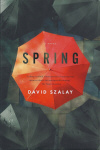Spring
The first section of Spring, by British writer David Szalay, has the feel of listening to a clueless college pal heading for another romantic train wreck. An inscrutable, perhaps capricious woman becomes the blank screen on which he paints his own meanings. James, now in his mid-thirties, is no longer a hipster entrepreneur, having already gained and lost a fortune in the volatile economics of the dot-com world. He is bright and wounded and seems to choose cluelessness in a willful way. He ruminates about his downsized life expectations:
The first section of Spring, by British writer David Szalay, has the feel of listening to a clueless college pal heading for another romantic train wreck. An inscrutable, perhaps capricious woman becomes the blank screen on which he paints his own meanings. James, now in his mid-thirties, is no longer a hipster entrepreneur, having already gained and lost a fortune in the volatile economics of the dot-com world. He is bright and wounded and seems to choose cluelessness in a willful way. He ruminates about his downsized life expectations:
No more magnificence. Now, he just wants things to be okay.. . . Perhaps a few modest luxuries. A middle-class life in other words. And a woman. Of course a woman. She is the indispensable ingredient for such a life. Without her it would have quite a sad, lonely look.
He obsessively parses every interaction with his new love interest, Katherine: will she/won’t she, does she/doesn’t she?
Luckily, the writer’s intention is more complex than this romance-flick cliché. He writes strong scenes of contemporary social interaction laced with humor, all of which keep you going. Then the novel opens out, weaving together a multiplicity of close third-person narrations that put the reader in a privileged position, adding poignancy along with irony and some humor when the characters come together with their various myopias.
Katherine works as a hotel manager, hoping to learn enough to open her own inn somewhere. Married though separated, James is the first man she has been with since the split. The intensity of old feelings pulls at her. “The past. As if someone had forgotten to lock its cage and it had slipped out, looking for her. It is on the loose now. ” Her ex-husband, Fraser, is a hack fashion photographer with disappointed artistic aspirations. To be with her, he left a wife and child. Szalay underscores the leap of trust Katherine had to take: “He himself had once told her. . . that even if he did leave his wife, she would never trust him. . . .However, she insisted on trusting him. She had to trust him. What was the point otherwise?” There was the inevitable betrayal, and now, Fraser has come back, asking for a second chance, complicating the relationship with James.
Szalay writes with brave honesty about the nuances of sex, the way the body sometimes refuses to go along with hope and desire, the way ambivalence complicates intimacy. Katherine and James’s first night together is, per James, a fiasco. During their second encounter, she asks him not to come inside her, and afterwards, he isn’t sure if he has or not:
“Is that normal for you?”
“No. . . ”
She was shaking her head. “. . . I never let anyone come inside me. I’ve only ever let one person do that. Someone I was totally in love with.”
For a moment he wondered who this man was. Then he stood up stumbling in his lowered trousers. “Look, I’m sorry,” he said.
Equally sad is Katherine’s experiment with patching things up with Fraser:
“You’re very angry with me,” Fraser said finally.
. . . So what was it? It was his eyes. His squinting eyes, with whose joyously sexual merriment she had once fallen thuddingly in love, were polluted with sadness. They were polluted with sadness and fear.
A second narrative woven in with the love relationship involves the sordid world of horse racing. James begins by setting up a website that sells racing tips and ends up partnering with an alcoholic journalist school chum by investing in a horse. They will make big money through a race-fixing scheme. James knows that the quick-fix, sure-thing will bite you back, yet he still hopes. He fails all around because a horse is no more predictable than a woman, and in horse racing someone is always manipulating a bigger fix than yours. Colorful characters are associated with this racetrack world, and their points of view are an excursion, but at times they seem part of a separate novel that wants to gallop off in another direction.
The true emotional center of the book is Katherine, whose growing awareness becomes quite moving. She faces the devastation of no longer loving Fraser and is unable to connect with James, who wants her but can’t see her. The sense of estrangement generalizes to her entire middle-class milieu; she pulls herself together and gets out.
Spring is Szalay’s picture of “the way we live now”: characters who wish to change but keep finding new ways to replay old patterns, hungering in the face of diminishing possibility. Finally, despite the disparate pieces, the sum of the book becomes greater than its parts, and each part is rendered with acute insights whose sharpness keeps making you return to reexamine and rethink.





